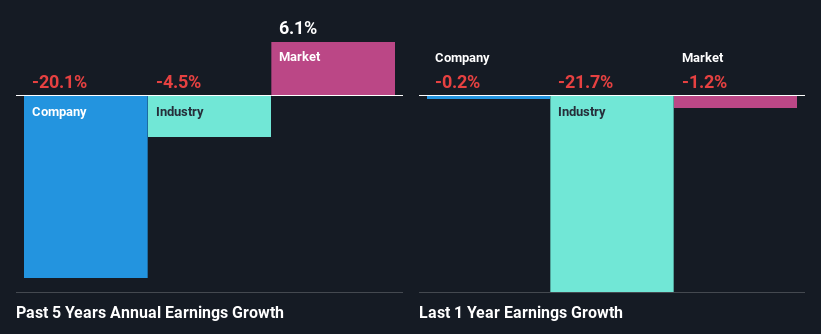- China
- /
- Basic Materials
- /
- SHSE:600724
Ningbo Fuda Company Limited's (SHSE:600724) Stock's Been Going Strong: Could Weak Financials Mean The Market Will Correct Its Share Price?

Ningbo Fuda's (SHSE:600724) stock is up by a considerable 54% over the past three months. However, we decided to pay close attention to its weak financials as we are doubtful that the current momentum will keep up, given the scenario. Specifically, we decided to study Ningbo Fuda's ROE in this article.
Return on equity or ROE is an important factor to be considered by a shareholder because it tells them how effectively their capital is being reinvested. In simpler terms, it measures the profitability of a company in relation to shareholder's equity.
Check out our latest analysis for Ningbo Fuda
How Do You Calculate Return On Equity?
Return on equity can be calculated by using the formula:
Return on Equity = Net Profit (from continuing operations) ÷ Shareholders' Equity
So, based on the above formula, the ROE for Ningbo Fuda is:
6.8% = CN¥219m ÷ CN¥3.2b (Based on the trailing twelve months to September 2024).
The 'return' refers to a company's earnings over the last year. One way to conceptualize this is that for each CN¥1 of shareholders' capital it has, the company made CN¥0.07 in profit.
What Has ROE Got To Do With Earnings Growth?
So far, we've learned that ROE is a measure of a company's profitability. Based on how much of its profits the company chooses to reinvest or "retain", we are then able to evaluate a company's future ability to generate profits. Assuming everything else remains unchanged, the higher the ROE and profit retention, the higher the growth rate of a company compared to companies that don't necessarily bear these characteristics.
Ningbo Fuda's Earnings Growth And 6.8% ROE
When you first look at it, Ningbo Fuda's ROE doesn't look that attractive. However, given that the company's ROE is similar to the average industry ROE of 5.9%, we may spare it some thought. But Ningbo Fuda saw a five year net income decline of 20% over the past five years. Bear in mind, the company does have a slightly low ROE. Therefore, the decline in earnings could also be the result of this.
As a next step, we compared Ningbo Fuda's performance with the industry and found thatNingbo Fuda's performance is depressing even when compared with the industry, which has shrunk its earnings at a rate of 4.5% in the same period, which is a slower than the company.

The basis for attaching value to a company is, to a great extent, tied to its earnings growth. The investor should try to establish if the expected growth or decline in earnings, whichever the case may be, is priced in. By doing so, they will have an idea if the stock is headed into clear blue waters or if swampy waters await. Is Ningbo Fuda fairly valued compared to other companies? These 3 valuation measures might help you decide.
Is Ningbo Fuda Making Efficient Use Of Its Profits?
Ningbo Fuda's declining earnings is not surprising given how the company is spending most of its profits in paying dividends, judging by its three-year median payout ratio of 94% (or a retention ratio of 5.8%). With only very little left to reinvest into the business, growth in earnings is far from likely. You can see the 2 risks we have identified for Ningbo Fuda by visiting our risks dashboard for free on our platform here.
In addition, Ningbo Fuda has been paying dividends over a period of at least ten years suggesting that keeping up dividend payments is way more important to the management even if it comes at the cost of business growth.
Conclusion
In total, we would have a hard think before deciding on any investment action concerning Ningbo Fuda. Specifically, it has shown quite an unsatisfactory performance as far as earnings growth is concerned, and a poor ROE and an equally poor rate of reinvestment seem to be the reason behind this inadequate performance. Up till now, we've only made a short study of the company's growth data. So it may be worth checking this free detailed graph of Ningbo Fuda's past earnings, as well as revenue and cash flows to get a deeper insight into the company's performance.
Valuation is complex, but we're here to simplify it.
Discover if Ningbo Fuda might be undervalued or overvalued with our detailed analysis, featuring fair value estimates, potential risks, dividends, insider trades, and its financial condition.
Access Free AnalysisHave feedback on this article? Concerned about the content? Get in touch with us directly. Alternatively, email editorial-team (at) simplywallst.com.
This article by Simply Wall St is general in nature. We provide commentary based on historical data and analyst forecasts only using an unbiased methodology and our articles are not intended to be financial advice. It does not constitute a recommendation to buy or sell any stock, and does not take account of your objectives, or your financial situation. We aim to bring you long-term focused analysis driven by fundamental data. Note that our analysis may not factor in the latest price-sensitive company announcements or qualitative material. Simply Wall St has no position in any stocks mentioned.
About SHSE:600724
Ningbo Fuda
Engages in the urban commercial real estate operation and management in China.
Flawless balance sheet average dividend payer.


